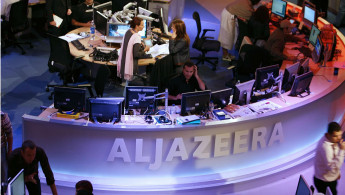Journalists, NGO slam Saudi 'threats' to close Al-Jazeera
Journalists and human rights activists denounced "threats" by Saudi Arabia and its allies against Qatari media organisations on Tuesday, including satellite news broadcaster Al-Jazeera.
Rights groups, academics and representatives of international organisations condemned "threats" by Saudi Arabia and its allies, during a two-day conference on "freedom of expression" organised by Qatar.
"The conference condemns unequivocally the threats by the governments of Saudi Arabia, the United Arab Emirates, the Arab Republic of Egypt and the kingdom of Bahrain demanding the closing down of Al-Jazeera and other media outlets," it said.
Human Rights Watch executive director Kenneth Roth opened the conference on Monday saying: "Political freedom and especially free expressions are very much at the heart of the crisis facing Qatar today."
He called the conference "an important sign of commitment on Qatar's part to engage in some of the reforms that will enable them to maintain their moral high ground".
"This country is no more a democracy than the other Gulf countries," Roth said, calling on Doha "to become a genuine regional leader in human rights".
Meanwhile, Seamus Dooley, the acting secretary general of the National Union of Journalists for the UK and Ireland, said journalists "are not pawns in a political game" noting he and others had had to "think twice" before accepting Qatar's invitation to the conference over its "fundamental issues" with the rights of women, minorities and freedom of expression.
But the head of Qatar's National Human Rights Committee, Ali Bin Samikh al-Amarri, thanked delegates for "defending" Al-Jazeera, saying it was tantamount to "defending freedom of expression and the right to information".
State-aligned media in Saudi Arabia, the UAE, Bahrain and Egypt have engaged in an orchestrated campaign against Doha since they cut ties with the emirate in June, accusing it of backing extremism and fostering ties with their rival Iran. Qatar has denied the allegations.
On Tuesday, the anti-Qatar bloc upped the pressure on Qatar, unveiling a "terrorist" blacklist of 18 organisations and individuals suspected of links with Islamist extremists that they say had ties with Doha.
It has failed to specify the required changes to end the economic and diplomatic blockade, which was imposed on Qatar by the Arab bloc over unsubstantiated claims it has supported Islamist extremists.
Qatar's Sheikh Tamim said in a televised speech late on Friday that Qatar was prepared to talk with the four countries lined up against it, but that any resolution must respect its sovereignty and the terms cannot be dictated from outside.
In the Emir's first address following the blockade, he denounced the "malicious smearing campaign" directed against the emirate.
Qatar has categorically denied the claims.
Sheikh Tamim stressed during his speech that Doha does not support terrorism.
"We are fighting terrorism relentlessly and without compromises… true Islam could never be a source of terrorism," he said.
On Thursday, Sheikh Tamim amended the country's anti-terror laws just days after Qatar signed an agreement with the US that aimed at curbing the financing of terror.





 Follow the Middle East's top stories in English at The New Arab on Google News
Follow the Middle East's top stories in English at The New Arab on Google News


